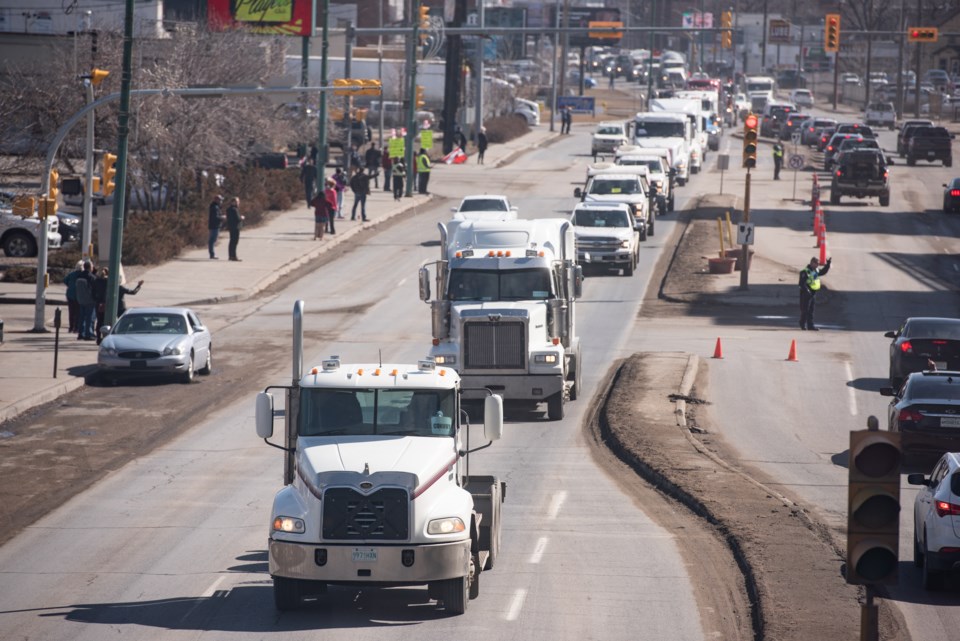April 4 was going to be a big day. So big, I took our 14-year-old daughter, Katrina, out of class to help me cover it. Why? As I told several people, “Not all education occurs in the classroom.”
Not one person disagreed with me. Many wished they had brought their kids, as it was an education.
This day would be the Regina Rally Against the Carbon Tax, but don’t let that name fool you – it wasn’t a one issue protest. The four points included the carbon tax, building pipelines, killing Bill C-69 (the no more pipelines bill) and killing Bill C-48 (the tanker ban off the northern B.C. coast).
After a month of planning, it had all come to a head. Somewhere over 700 trucks, mostly heavy trucks, rolled into Regina as part of the convoy that preceded the rally.
I had been covering the principle planning meetings in Weyburn each Thursday leading up to it. The first one I attended was essentially “Day 2,” after the core group of organizers first tossed out the idea. In the following weeks, the group kept growing and growing, with more and more people stepping up to the plate.
One of the things I glommed onto was that there was a very high agricultural component to the organizing committee. While several of the oilmen were also farmers, there were several straight-up farmers pouring their heart and soul into this event as well.
That was eye-opening. If ever the ag and oil sectors came together in a common cause, it was before my time. Yet this partnership of two of the most important sectors of our economy worked well together, and for the same purpose.
This bore out in the participation of the convoy. The lady who handled all the registrations told me the day before the trucks rolled that her estimation was there was a 60/40 split, in favour of ag, when it came to registrations. Now, many of the oilfield service sectors may have sent more units per individual company, but whichever way the cookie crumbled, this was not a token presence from either ag or oil. They were in this together.
There was no small coincidence that the farmers came out in droves, especially after . When he spoke at the rally, his ovation was even louder than Premier Scott Moe’s. He was one of their own.
I had made arrangements to position cameras high up in the Delta Marriott Hotel, positioned right along the convoy route through downtown Regina. As Katrina filmed from street level, I moved about, and found myself in the overhead walkway between the hotel and the casino.
It was there, while broadcasting a live stream on Facebook, I encountered what could be best described as a Millennial hipster. Standing beside me, he appeared to be talking to himself about why this convoy was such a bad idea. He talked about hour we shouldn’t be using oil for transportation, but rather electrical vehicles, for instance.
I am not one to allow comments like that to slide, so I pointed out to him that there isn’t a battery made that could run one of those trucks, like the cement truck passing below us, for a day. As for why this was going on, I explained that compared to 2014, about half of the oilfield lost their jobs.
I was biting my tongue, as I didn’t want to embarrass the gentleman from the hotel who had been kind enough to assist me that morning. But as the beaking off Millennial continued his diatribe about the noise of the convoy near his home, I looked over to him and said, “I see you are wearing synthetic clothes, and plastic glasses. You had a choice, sir. You could have worn animal skins, but you didn’t.”
He replied that he was wearing what was available to him. I replied that my father was a hunter, and hunted deer. If he wanted to, he (the hipster) could have worn animal skins, but he wasn’t.
He had a choice.
I stepped away at that point, lest I get into it full force. I was on-mission, and I didn’t want to embarrass the hotel man.
It was only three days later when I realized this was almost word-for-word identical to a conversation I had in the fall of 2017, at the University of Regina, with two women who were making similar comments at a student film called “
I don’t know how I keep ending up beside these types of people, but as I pointed out in a , I didn’t see their horses.
Educational, indeed.
Ěý
Brian Zinchuk is editor of Pipeline News. He can be reached at [email protected].




